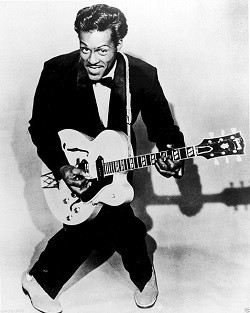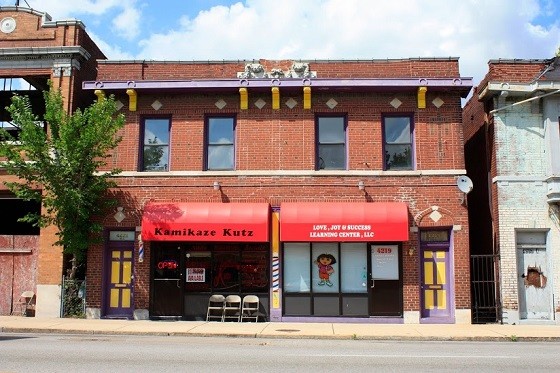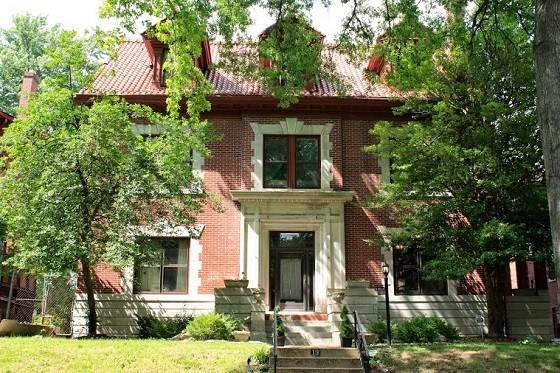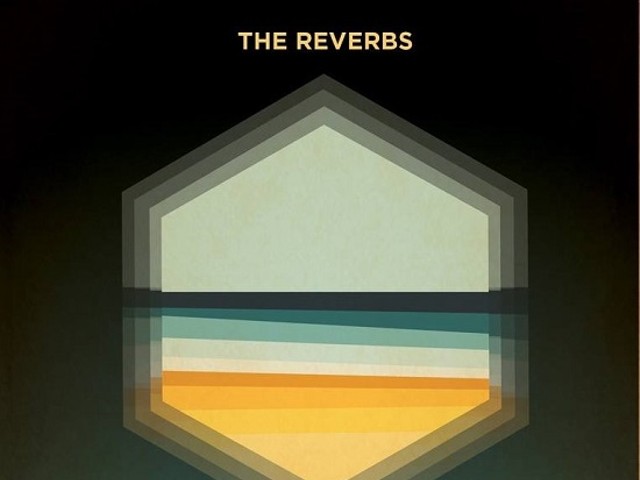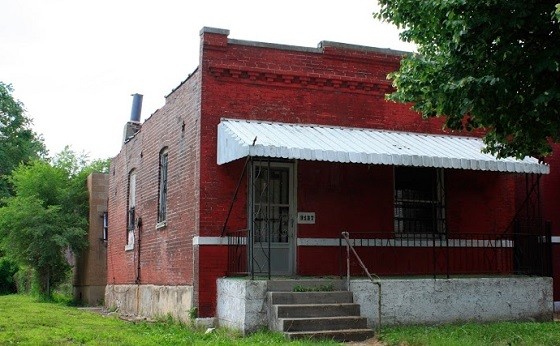
3137 Whittier Street In 1950 an expecting Chuck and Themetta purchased their first home at 3137 Whittier Street. It was around this same time that Berry bought his first electric guitar, a second-hand instrument purchased for $30 in $5 installments. Soon an old friend who sang with Berry at the Sumner High School choir called Berry and invited him to play with his hand. After a several gigs, Berry caught the attention of boogie-woogie keyboardist Johnnie Johnson, who asked him to perform with his band at the Cosmo Club in East St. Louis, Illinois. The group soon became known as the Chuck Berry Combo, and by 1955, an enterprising Berry stopped by unannounced at Chess Records in Chicago and signed a contract.
It was while living at the Whittier home from 1950 to 1958 that Berry recorded his biggest hits, including "Maybelline," "Rock and Roll Music," "Sweet Little Sixteen," "Johnny B. Goode," "Reelin' and Rockin'," and "Roll Over Beethoven." In 1956 Berry's growing family (he and Themetta would eventually have four children) led him to build a two-room addition onto the back of the Whittier home. In 2012 the house was added the National Register of Historic Places, and today the badly deteriorating home is one of thousands of vacant properties owned by the city's LRA. Still visible (though faded) is the "B" on the home's metal awning that stands for "Berry." In his autobiography, Berry writes of his home on Whittier:
Savings were really accumulating in our joint account, and we finally found a house we were able to buy. We chose a small three-room brick cottage with a bath and full basement at 3137 Whittier Street, only five blocks from 4319 Labadie. Four-hundred and fifty cold cash dollars at one counting was the sweaty down payment on the $4,500 home. The white family of Dimottios who lived next door welcomed us with open arms, giving us a pot of spaghetti over the backyard fence. I remodeled the house, adding a half bath and bedroom in the basement, where we moved so we could rent out the upper three rooms for additional income.Next: Berry buys a building to serve as headquarters for his budding music business and fan club.
4221 Dr. Martin Luther King Jr. Drive (formerly Easton Avenue) In late 1957 Berry established Chuck Berry Music Inc. and the Chuck Berry Fan Club, both of which operated out of a building he purchased at 4221 West Easton Avenue (now known as Dr. Martin Luther King Drive). It was inside this building that Berry produced his hit song "Memphis," recording the tune on a $79 Sears-Roebuck recorder. Today the building houses a hair salon and a daycare center.
Next: Berry opens up Club Bandstand, a music venue and tavern on North Grand Avenue.
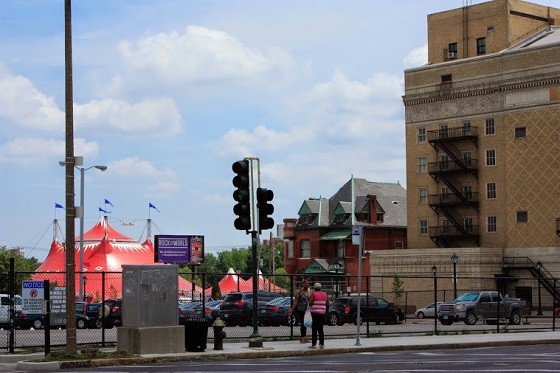
814 North Grand Avenue In 1959 Chuck Berry opened up Club Bandstand, a bar and music venue adjacent to Powell Hall that he hoped would be like the mixed-race nightclubs he'd seen in the Northeast. It never took off. That same year, Berry was arrested for transporting a minor across state lines when he brought a fourteen-year-old woman he had met in El Paso, Texas, up to St. Louis to work for him at Club Bandstand. Berry would eventually be convicted of violating the Mann Act (also known as the "white-slave traffic act" for the racist ways in which it was enforced) and sentenced to three years in prison. Club Bandstand closed quietly within a year of opening its doors. Writes Berry:
The city came down with all sorts of ordinances about fire protection orders, and complaints were said to be coming from businesses a half block away about the noise and prowling late at night. When the liquor license was threatened because of an owner being involved in criminal activities, I decided to pull the stakes and quit.Next: Chuck and Themetta move into a large home on a private street in north St. Louis.
13 Windermere Place By the late 1950s Chuck Berry was constantly on the road touring and starting to receive handsome royalty checks for his music. He had finally made it, and in 1958 he and Themetta (whom he calls "Toddy") purchased what would be their last property in St. Louis before the money really started flowing and he moved on to mansions west of town. Writes Berry of his home on Windermere Place:
Jully 11, 1958, I purchased a large eleven-room dwelling on the northern half of a private street, 13 Windermere Place, for $30,000. It was more elaborate than anything Toddy and I'd ever dreamed of living in.Contact the author at [email protected] or on Twitter @chadgarrison.
RFT MUSIC'S GREATEST HITS
The 15 Most Ridiculous Band Promo Photos Ever This Incredible Make-A-Wish Teenager Went to the Gathering of the Juggalos, Got a Lap Dance (NSFW) Crotching Whiskey at the Justin Bieber Concert and Getting Thrown Out: A Review The Top Ten Ways to Piss Off Your Bartender at a Music Venue
Follow @rftmusic

